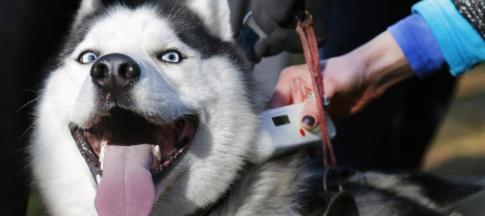
Before Brexit, pet passport holders could freely travel between EU countries without quarantine under the Pet Travel Scheme (PETS).
This made it easier for people to take their cats, dogs and ferrets on holiday. Now it's different.
We explain the changes for pet owners travelling to the EU and Northern Ireland.
What's a pet passport?
It's a document that allows dogs, cats and ferrets to enter other countries without having to quarantine.
It was originally used for pets to enter and re-enter Britain from the EU and other listed countries.
Pet passports were taken out of use in the UK for a while, being replaced in 2021 by animal health certificates (AHCs). These are certificates pet owners needed to get from their vet to get their pet over borders.
But in May 2025, it was announced that they were set to be reintroduced for UK residents travelling to the EU.
The upcoming EU travel rules for pets
While not yet in effect, the UK is expecting new travel rules soon for pet passports.
These rules will likely mean that pet passports will replace AHCs for pet travel between the UK and EU.
Unlike AHCs, pet passports can be used for multiple trips, which removes the fuss of getting new documents every time you want to travel to the EU with your pet.
This is the case so long as your pet has all its vaccinations up to date.
It’s not yet known when pet passports will be back in the UK, but the rule is being worked on as part of the EU-UK trade deal.
Travelling between the UK and Ireland
On top of these upcoming EU travel rules, a new rule has also come into effect for UK residents travelling to and from Northern Ireland with their pets.
As of early June 2025, pet owners travelling from the UK to Northern Ireland need a Pet Travel Document, or PTD.
How do PTDs work?
You need to get your PTD 10 days or less before your trip with your pet. You can apply for a PTD online.
Your pet also needs to be microchipped before travelling to Northern Ireland.
You can find more in-depth info about these new rules on the UK Department of Agriculture, Environment and Rural Affairs website.
If you’re travelling to the EU
While new pet passport rules are set to come into effect in the future, they’re not in place yet.
So, for the time being, you’ll still need an animal health certificate (AHC) if you want to travel with your pet from the UK to the EU and back.
How to get an animal health certificate
To get an AHC, check that your usual vet can give you one. Only an official veterinarian (OV) can sign them. You need to get an AHC no more than 10 days before you intend to travel.
There are a few know to remember before getting your AHC:
- You'll need to prove your pet's microchipped and provide its vaccination history. Your pet's usual vet should have all these details on file.
- You can have up to five pets on it.
- The cost varies between vets, but it's usually around £100-£150, which includes the price of a vet consultation and time for them to review any paperwork.
- You'll need a new one for each trip you want to take, but your pet won’t need a repeat rabies vaccination if the last one is still up to date.
Once issued, you have a 10-day window to enter the EU.
It’ll be valid for four months of onward travel within the EU and four months of re-entry to Britain.
Rabies vaccinations
You have to vaccinate your dog, cat or ferret against rabies before they can travel.
They must be at least 12 weeks old, and a vet has to see proof of their age before vaccinating them.
You need to wait 21 days to travel after your pet is vaccinated to make sure they’re properly protected.
You need to book booster vaccinations every year too. Your vet should keep their vaccination record up to date, but it's worth checking it to make sure.
Tapeworm treatments for dogs
A vet must treat your dog for tapeworm and record it on the AHC whenever you want to travel to Europe.
Dogs need to have treatment between 24 and 120 hours before entering. The vet giving the treatment will need to provide:
- details of the worming product
- the date and time of treatment
- their stamp and signature
If they don’t, your dog could be refused entry to Britain or put in quarantine.
Check the rules of the country you're travelling to for any extra restrictions or requirements too.
Travelling to a non-EU country with your pet
If you're travelling from Britain to a country outside the EU, you'll need an export health certificate (EHC) that checks that your pet meets the country's requirements.
Each country has its own EHC requirements, so you should search for the country you're travelling to on GOV.UK.
You'll also need to fill in an export application form. Your vet will check and sign the EHC and make sure you have the right travel documents.
Travelling on planes with your pet
The International Air Transport Association Live Animal Regulations mean air travel operators have to provide suitable conditions for pets.
Unless your pet is an assistance dog, it'll need to travel in the hold of a plane, which could be closed longer than expected if you have a delayed flight.
Pets can find air travel stressful. Putting a blanket from home or a favourite toy in the carrier with them can help them feel more settled on the journey.
Before booking a flight, check the airline's pet travel policy and make sure they’re on the government-approved pet travel airlines list. Visit GOV.UK for an up-to-date list.
Travelling on ferries with your pet
Ferries are similarly regulated to airlines. Your pet will likely have to stay in your vehicle or in a container area during travel.
Check your ferry company's pet policy for specific details and make sure they’re a government-approved operator on the pet travel sea and rail route list.
Again, GOV.UK is your best bet for an up-to-date list.
Returning to Great Britain with a pet
When you arrive in Britain, an official will check, sign and stamp your pet's travel documents.
If they refuse your pet entry, they'll keep it in quarantine until your pet has any necessary treatment.
Sometimes, it may be deported to the country you travelled from or, in extreme cases, put to sleep.
If you enter Britain from outside the EU, you can only collect your pet after it’s been taken through customs. You can pay an agent, travel company or airline to do this for you.
If you can't do this, contact the customs office where you arrive before you travel or ask the National Clearance Hub at nch@hmrc.gov.uk for more information.
Before you travel with your pet
Many pets can find travelling stressful, especially if it means being separated from their owners for the journey.
If your pet is likely to struggle with the change of routine and environment, leave them with a trusted friend, family member or reputable pet sitter at home.
If you decide to take your pet, you should:
- Check that your holiday destination has all the necessary facilities.
- Check you can get your pet's usual food while you are away, and make sure you take plenty with you if you can't. A sudden change in food can lead to an upset stomach.
- Consult a vet if you're not sure how your pet will cope with travelling. They'll be able to advise you on the best options for you and your pet.
Pet insurance when abroad
Pet insurance can be a good idea when taking your pet abroad.
Many insurers have cover for pets overseas but check it’s that included in your policy before you travel.
Some insurers have exclusions for specific countries, meaning your pet might not get cover when travelling there.
We extend our pet insurance to European destinations for up to 30 days per policy term.
I’ve spent 20 years writing about pets and exploring the wonderful relationships they have with their owners. I started as a staff writer on Dogs Today magazine, working my way up to become deputy editor in 2008. In 2010, I left the office to pursue a freelance career, relocated to north Norfolk and started a family.
Over the years I’ve contributed thoughtful human-interest features, celebrity interviews and investigative news stories to publications including The Sunday Times, Dogs Today, Dogs Monthly and Your Cat. I’ve also ghost-written veterinary books and press releases for the pet industry.
When I’m not writing, I enjoy long walks in the Norfolk countryside with my rescue lurcher Popsie. These are always followed by tea and cake.




